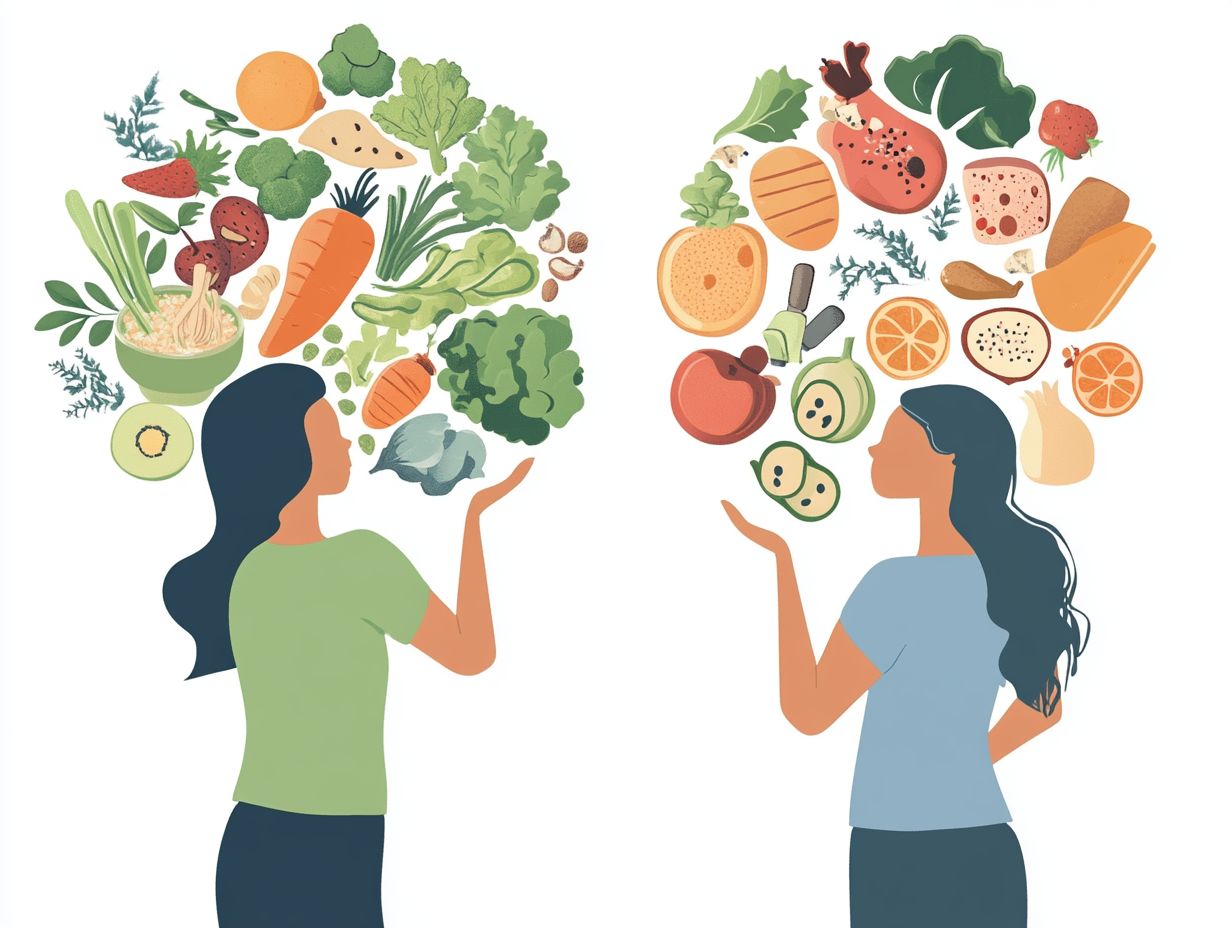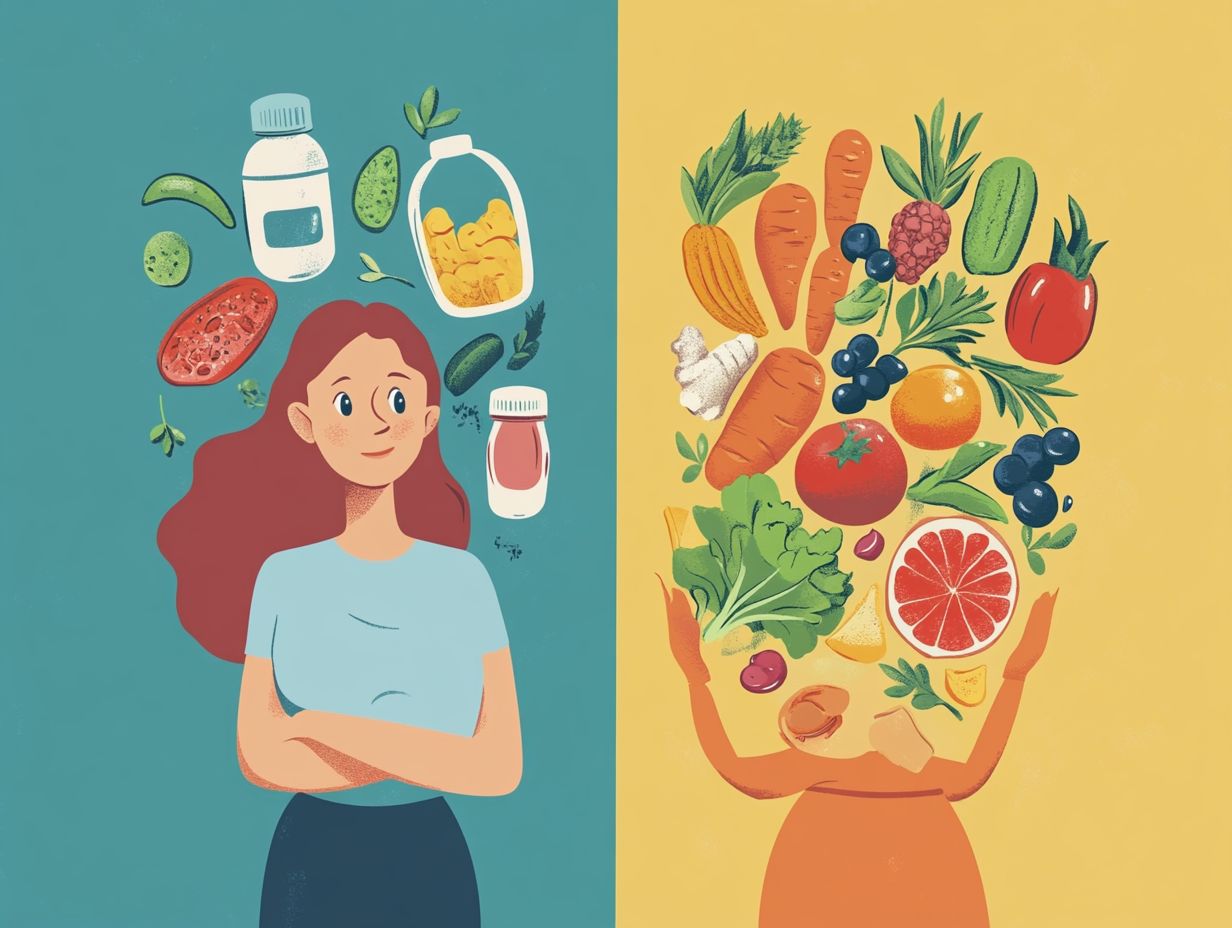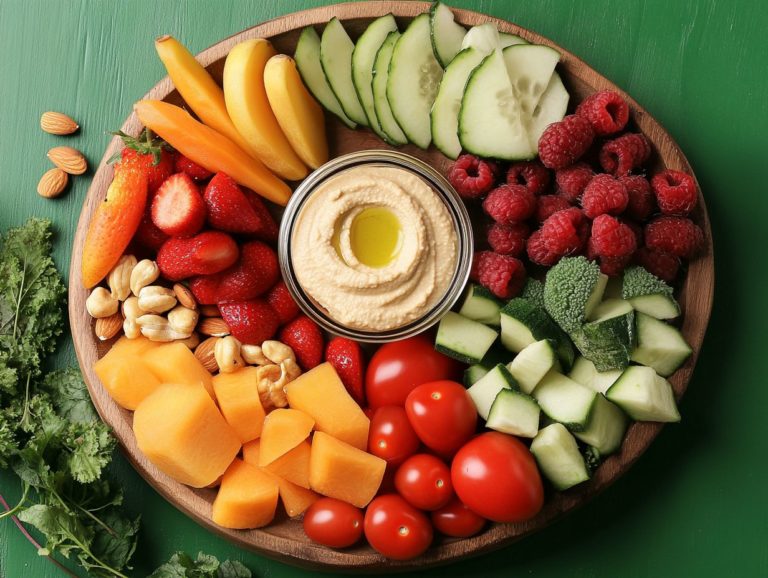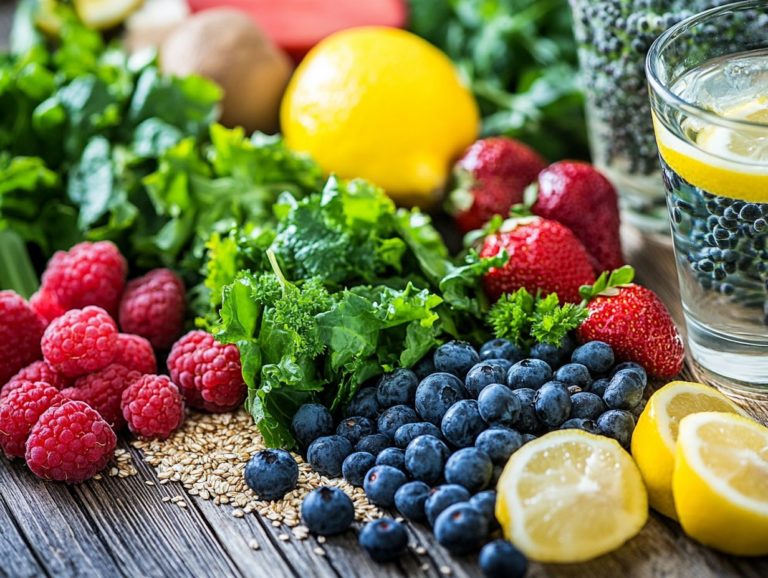10 Common Detox Myths Debunked
Detoxing is a hot topic in health circles, but misconceptions often cloud its true purpose. Let s dive into the truth behind detoxing!
You might think detox diets are solely for shedding pounds or that they hold the key to curing all health problems. It s easy to become entangled in this web of misinformation.
This article delves into ten prevalent myths about detoxing, shedding light on what it genuinely entails, along with its benefits and risks, and how to approach it safely.
Let s embark on this journey together, separating fact from fiction and uncovering the true nature of detoxing.
Contents
- Key Takeaways:
- 1. Detoxing Is Only for Weight Loss
- 2. Detox Diets Are Safe for Everyone
- 3. You Need Special Products or Supplements for Detoxing
- 4. Detoxing Can t Cure All Health Issues
- 5. You Can Detox Your Body in a Few Days
- 6. Detoxing Is a One-Time Fix
- 7. You Can’t Eat While Detoxing
- 8. Detoxing Only Involves Diet Changes
- 9. Detoxing Is the Same as Fasting
- 10. You Can’t Detox While Taking Medications
- What Is Detoxing and How Does It Work?
- Frequently Asked Questions
Key Takeaways:

- Detoxing is not just for weight loss – it can also improve overall health and well-being.
- Detox diets are not safe for everyone and can pose significant risks.
- You do not need special products or supplements to detox; simple dietary changes, including optimizing your intake of electrolytes and herbs, can be effective.
1. Detoxing Is Only for Weight Loss
Detoxification is often misunderstood as just a weight-loss tactic. However, it s a crucial part of your recovery journey from alcohol and opioid addiction.
Detox addresses the physical and psychological shifts that occur during this transformative process. By creating a safe environment for you to flush toxins from your system, detox lays the groundwork for deeper emotional healing and essential lifestyle changes that support long-term recovery.
These lifestyle changes may include adopting a plant-based diet rich in whole grains and healthy fats. This vital first step not only eases withdrawal symptoms but also helps you reconnect with your emotions, fostering a self-awareness that may have been lost to substance use.
Incorporating detox into a broader treatment framework, which may include medical support, encourages you to adopt healthier habits, such as mindfulness practices and good nutrition. This comprehensive approach can significantly boost your overall well-being and empower yourself to pursue a sustainable and fulfilling life free from addiction.
2. Detox Diets Are Safe for Everyone
While detox diets may have an enticing allure, they aren’t universally safe and can carry significant risks, especially for those recovering from alcohol or opioid addiction or with pre-existing health conditions like cardiovascular disease.
If you re in recovery from alcohol or opioid addiction, adopting such restrictive eating patterns could result in nutrient deficiencies. These deficiencies might heighten cravings and increase the risk of relapse.
The common health myths surrounding detox diets like the idea that extreme measures can purify the body often ignore the crucial role that a balanced diet plays in holistic recovery. These misguided beliefs can mislead vulnerable individuals, steering them toward questionable practices that jeopardize their overall health and safety.
It s essential for anyone in recovery to prioritize evidence-based nutrition, ensuring that their dietary choices foster long-term well-being instead of introducing unnecessary risks.
3. You Need Special Products or Supplements for Detoxing
The notion that you need special products or supplements like detox teas for effective detoxification is quite misleading. In reality, a well-rounded approach to recovery can often be achieved through natural dietary choices and lifestyle changes.
Many individuals overlook the incredible power of whole foods and a balanced diet in supporting the body’s innate detoxification processes. Fresh fruits, vibrant vegetables, whole grains, and lean proteins offer essential nutrients that are vital for healing and revitalization.
Rather than depending on costly detox supplements, you may discover greater benefits by nourishing yourself with real, wholesome foods, focusing on a balanced intake of carbohydrates and fats. Medical support is also crucial in a comprehensive recovery plan, as it stabilizes the system and enhances the recovery process when paired with dietary improvements.
This combination helps pave a more sustainable path to wellness.
4. Detoxing Can t Cure All Health Issues
Many people mistakenly believe that detoxing can fix all health issues. While detox can support addiction recovery, it’s just one part of a bigger strategy.
This misunderstanding causes people to overlook the importance of complete treatment plans, which should include early intervention and 12-step programs to address both the mind and social aspects of addiction.
Detoxification alone simply removes harmful substances from the body. It does not confront the underlying behaviors and thought patterns that fuel substance dependency.
Incorporating additional methods, such as Cognitive Behavioral Therapy (CBT), which helps change harmful thoughts and behaviors, and support networks like Alcoholics Anonymous, equips you with essential tools and coping strategies. These tools help you manage triggers and cravings effectively.
Engaging with support networks fosters a sense of community and accountability, both of which are critical for lasting recovery.
Ultimately, detox should be viewed as just one part of a holistic approach to wellness.
5. You Can Detox Your Body in a Few Days
The idea that detoxing can be accomplished in just a few days is a common misconception. Real detox and recovery take time, but the journey is worth it!
This process is especially vital for those struggling with alcohol and opioid addiction, as the body experiences significant physiological shifts. Withdrawal symptoms can last weeks or even months.
During this time, your body gradually eliminates toxins while striving to restore its natural balance. It’s more than simply stopping substance use; holistic recovery involves embracing healthier habits, participating in supportive therapies, and, when necessary, seeking medical supervision.
By emphasizing gradual changes such as improving your nutrition, incorporating regular exercise, and practicing mindfulness you significantly enrich your recovery journey.
These changes set the stage for lasting health and resilience against relapse.
6. Detoxing Is a One-Time Fix

Detoxification is often misunderstood; it’s not a one-time solution but rather an ongoing journey that requires continuous effort and effective strategies to avoid relapse.
As you navigate the waters of addiction recovery, it’s essential to recognize that your journey encompasses physical cleansing as well as emotional and psychological healing.
Building a strong support network of friends, family, and support groups acts as your safety net during tough times.
By committing to healthy lifestyle choices like regular exercise, balanced nutrition, and mindfulness practices you reinforce your dedication to a sober life.
Nurturing resilience through community engagement and personal growth, supported by methods like Cognitive Behavioral Therapy and lifestyle changes, can greatly enhance your ability to tackle the complexities of recovery.
This significantly reduces the likelihood of slipping back into old habits and relapse.
7. You Can’t Eat While Detoxing
The common belief that you can’t eat while detoxing misses a crucial point: proper nutrition, including whole grains, lean proteins, and balanced meals, is vital for effective detoxification and overall recovery.
Nourishing your body with the right nutrients plays a significant role in supporting the healing process from substance use disorders, such as alcohol and opioid addiction.
A well-rounded diet enhances your liver’s ability to eliminate toxins. Vitamins and minerals are essential for restoring brain function and stabilizing your mood.
As you navigate detox, incorporating antioxidant-rich foods, lean proteins, and plenty of fruits and vegetables can improve your physical health and bolster your emotional well-being.
Ultimately, making mindful dietary choices creates a supportive environment for recovery, easing cravings and promoting a more resilient mindset.
8. Detoxing Only Involves Diet Changes
Detoxification involves more than just changing your diet. It requires a holistic approach that includes emotional and psychological shifts.
Explore your emotional triggers. Understand the psychological patterns that influence your choices.
Support networks play a crucial role in your growth. Practices like mindfulness, therapy, and support groups can foster meaningful personal growth.
Making lifestyle modifications, like committing to regular exercise, is essential. Establishing healthy routines helps rid your body of harmful substances while nurturing your mind and spirit.
This complete approach leads to a sustainable treatment plan promoting long-term well-being.
9. Detoxing Is the Same as Fasting
Detoxing often gets mistaken for fasting. Understanding this difference is key!
While both involve dietary changes, detoxification is all about clearing toxins from your body and supporting recovery from addiction, particularly in addressing alcohol and opioid addiction.
This distinction is crucial for those like you who are looking to rebuild your life after facing substance use challenges. Detoxing is designed to eliminate harmful substances that have built up over time, paving the way for a healthier physical and mental state.
On the other hand, fasting typically serves purposes like weight loss or spiritual cleansing. Misunderstandings about these practices can lead to unnecessary confusion.
Grasping the specific goals of each approach gives you the power to make informed choices that align perfectly with your recovery journey and overall well-being.
10. You Can’t Detox While Taking Medications
The notion that detoxing can’t happen while on medications is a common misconception. In reality, medication-assisted treatment is essential in guiding you safely through the detoxification process if you’re on the path to recovery from addiction.
Medications like methadone and buprenorphine have proven effective in alleviating withdrawal symptoms and cravings. They offer you a stabilizing effect during your recovery journey.
These pharmaceutical options enable you to detox under medical supervision while significantly reducing the discomfort typically associated with opioid withdrawal.
By integrating these treatments into a thorough recovery plan, healthcare providers can enhance their support for you, addressing not just the physical facets of addiction but also the emotional and psychological challenges that often arise.
What Is Detoxing and How Does It Work?
Detoxing is your pathway to removing harmful substances from your body, with a primary focus on recovering from substance use disorders such as alcohol and opioid addiction. This journey involves a series of physical and mental changes.
It all begins with an initial assessment, which lays the groundwork for a personalized plan tailored specifically to your needs. The first stage often brings about withdrawal, during which you may experience a range of symptoms as your body adjusts to the absence of the substance.
Following this, you might enter a stabilization phase aimed at alleviating discomfort and providing essential medical support. Detox does more than just cleanse your body; it prepares your mind for further therapeutic interventions.
This stage is critical for laying a strong foundation for lasting recovery and overall well-being. By addressing both the physical and emotional aspects, detoxing plays a vital role in fostering a healthier lifestyle free from addiction.
What Are the Benefits of Detoxing?

Detoxing has many benefits. It enhances your physical health, improves emotional stability, and provides a refreshing sense of clarity. These elements are essential in your journey of recovery from addiction.
You may feel brimming with energy, allowing for fuller participation in daily activities and social interactions. This revitalization can significantly strengthen your mental resilience, equipping you to handle cravings and emotional turbulence more effectively.
The removal of toxins not only supports your bodily functions but also cultivates a clearer mindset, enabling you to make better decisions. Emotionally, detoxing can act as a crucial turning point, encouraging self-reflection and establishing healthier coping mechanisms.
In essence, the blend of these physical and psychological enhancements creates a strong framework for sustained recovery and a more fulfilling life beyond addiction.
What Are the Potential Risks of Detoxing?
Detoxing offers benefits, but it s important to recognize potential risks. If you have a history of addiction, especially to alcohol or opioids, detox can present serious complications.
Withdrawal symptoms can range from mild discomfort to severe, life-threatening conditions like seizures or delirium tremens, which is a severe form of alcohol withdrawal that can cause confusion and shaking. Understanding this is crucial! Not all detox methods are equally safe, and having medical supervision can greatly reduce these risks.
Many mistakenly believe that detoxing alone is a cure for addiction, but in reality, a comprehensive treatment plan is often necessary for true recovery.
Being well-informed about these factors empowers you and your loved ones to make safer decisions and cultivate a healthier recovery journey.
How Can One Safely Detox?
Safely detoxing needs a structured approach. This approach emphasizes professional guidance, emotional support, and a commitment to healthy dietary choices for a successful recovery process.
Work with medical professionals who specialize in addiction for the best support. They equip you with the essential tools and strategies needed to manage withdrawal symptoms effectively.
Surrounding yourself with a supportive network of friends, family, or support groups adds a vital layer of encouragement and accountability throughout your detox journey.
Nutrition plays a pivotal role as well. Incorporating nutrient-dense foods not only aids in your physical recovery but also helps stabilize your mood and energy levels. By prioritizing these elements, you can craft a more balanced and effective detox experience, ultimately laying a strong foundation for long-term recovery.
What Are Some Common Misconceptions About Detoxing?
Many misconceptions about detox can hinder your recovery. Some people mistakenly believe that detox is just about physical withdrawal, missing the vital role of emotional support and therapy, which are essential for achieving lasting change.
Some think detox is a quick fix, disregarding the fact that it s merely the first step on a long journey toward recovery. By debunking these myths and embracing a holistic approach to detoxification, you can make more informed choices that genuinely support your health and well-being.
Embrace the journey of detoxing with the right knowledge and support to reclaim your health and happiness!
Can Detoxing Be Harmful?
Detoxing can be beneficial, but it also comes with risks. Let s explore how to do it safely!
While detoxing can yield beneficial effects, it can also pose significant risks if not approached with care, especially for individuals grappling with addiction or other health concerns.
Inexperienced management of the detox process may lead to severe physical and psychological consequences that could hinder your recovery efforts. For those recovering from alcohol or opioid dependence, the body often endures intense withdrawal symptoms that can escalate into life-threatening situations.
This risk is further amplified by the potential for relapse, as cravings can become overwhelming without professional guidance. Getting support from medical professionals and trained counselors ensures a safe transition.
The environment and methods utilized during detox can profoundly influence the overall success of your recovery process.
Frequently Asked Questions
What are the most common detox myths?

Don t fall for common detox myths; understanding the truth can keep you healthy! Some of the most common myths include the idea that detoxing is necessary to eliminate toxins from the body, that juice cleanses are the best way to detox, and that detoxing will lead to quick weight loss.
Do I need to detox regularly?
No, your body has its own natural detoxification processes and does not require outside help. Detoxing too frequently can actually be harmful to your health.
Will detoxing help me lose weight?
While detoxing may result in temporary weight loss due to a decrease in water weight, it is not a sustainable or healthy way to lose weight. Healthy and gradual weight loss is achieved through balanced nutrition and regular exercise.
Are juice cleanses effective for detoxing?
No scientific evidence supports the effectiveness of juice cleanses for detoxing. In fact, by eliminating whole foods and essential nutrients, juice cleanses may do more harm than good.
Should you cut out solid foods during detox?
No, your body needs a balanced and varied diet to function properly. Cutting out solid foods during a detox can lead to nutrient deficiencies and may harm your body’s natural detox processes.
Will detoxing improve my skin?
While some people may experience clearer skin after a detox, this is likely due to the increased consumption of water and healthy foods. There is no evidence that detoxing specifically improves skin health.
Before starting any detox program, consult with healthcare providers to ensure it’s safe for you.






